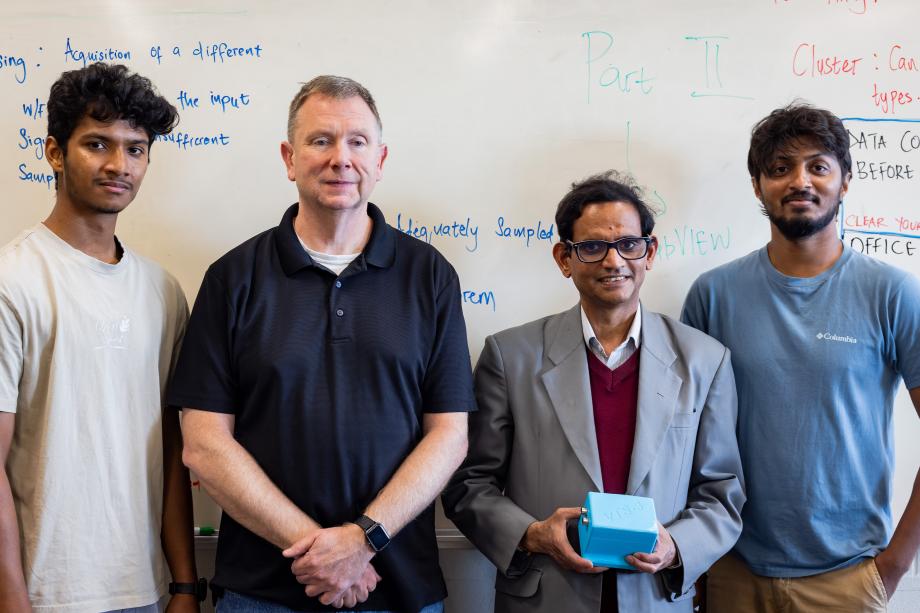Researchers advance vehicle technology and sustainability efforts
KALAMAZOO, Mich.—WMU researchers are advancing vehicle technology and sustainability efforts with the development of a virtual torque sensor (VTS) to measure engine performance.
The real-time torque estimation technology eliminates the need for the costly physical sensors found in vehicles today and enables more energy-efficient engine operation that also results in reduced emissions. With one patent already issued and two in the pipeline, the team is launching a company to commercialize sensors later this year.
“The VTS stands as a transformative technology with substantial commercial and societal impact, advancing goals of sustainability, reliability and operational excellence across diverse transportation vehicle applications,” says Dr. Muralidhar Ghantasala, professor of mechanical and aerospace engineering, and principal investigator for the project. “Accurate, real-time torque reporting contributes to fuel savings along with associated emission reduction, aligning with growing industry demands for energy-efficient solutions.
This advancement in torque reporting will help a broad variety of vehicle types improve fuel efficiency, making industrial, construction and agriculture industries more cost competitive and sustainable.
“Knowing that our work can make a meaningful difference to industry operations is deeply rewarding and motivating,” says Dr. Vivek Iddum, M.S.’18, Ph.D.’25, WMU research assistant who focuses on the algorithmic development and system integration aspects of VTS. “The interdisciplinary nature of the project includes mechanical systems, embedded hardware, and machine learning and makes the research both intellectually stimulating and practically impactful.
The project began at the request of Eaton Cummins Automated Transmission Technologies, a joint venture focused on leveraging their technical strengths and experience to provide better products for commercial vehicles. Developing the sensor has been a collaboration among academic and industry partners since the onset.
“These partnerships have enabled us access to a diverse portfolio of engine data, with at least three engines evaluated annually,” says Ghantasala. “Together, these efforts have culminated in the successful development of the third-generation VTS prototype.”
This prototype is an artificial intelligence (AI) and machine learning (ML) based system designed for accurate and reliable engine torque estimation in class 8 trucks.
In addition to Ghantasala and Iddum, WMU researchers for this project include John Bair, executive director of WMU’s Center for Advanced Vehicle Design and Simulation; Dr. Rick Meyer, associate professor of mechanical and aerospace engineering; and multiple undergraduate and graduate students from various disciplines at the College of Engineering and Applied Sciences.
“This project not only has a direct, measurable benefit to society through more efficient and cleaner engine operation, but also serves to train WMU students in cutting-edge techniques that they will take with them after leaving WMU,” says Meyer.
Local industry partners include Cripps & Fontaine Excavating and Peterman Concrete. Bryan Cooking Trucking in Louisiana has also participated in testing the sensor.
This research is supported by funding from the National Science Foundation Partnerships for Innovation (PFI) Program and Michigan Translational Research and Commercialization program administered by Michigan Economic Development Corporation, in addition to WMU’s own startup funding totaling close to $600,000.
“Looking ahead, the research team plans to develop a fourth-generation VTS prototype with a focus on scalability and adaptability across a wide range of engine and transmission configurations that are on the road today,” says Ghantasala.
For more information on the research and commercialization project, contact Dr. Muralidhar Ghantasala.
For more WMU news, arts and events, visit WMU News online.


